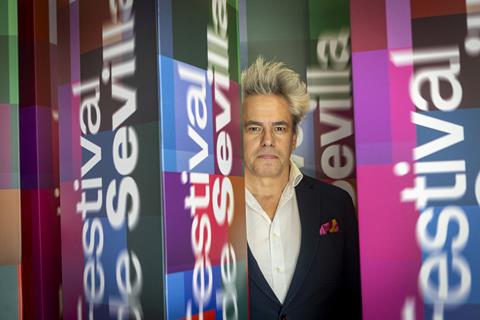
Spanish producer Manuel Cristóbal, a five-time Goya Award winner whose credits include Wrinkles, Buñuel In The Labyrinth Of The Turtles and The Glassworker, took over the Seville European Film Festival (SEFF) in 2023, succeeding José Luis Cienfuegos.
Cristóbal faces the task of redefining Seville’s place on Europe’s festival circuit while reinforcing its commitment to auteur-driven European cinema.
He talks to Screen about his vision, strategy and ambitions.
This is your third year running SEFF. What identity has the festival consolidated in that time?
Seville now has a clear identity: to present a broad and inclusive view of European cinema. Too often, ‘European cinema’ is reduced to a narrow auteur niche, but it’s far wider than that. We want a festival that embraces every form of storytelling — drama, comedy, animation, documentary, even genre.
Why should the European industry — distributors and sales agents — pay attention to Seville?
Because we want the festival to be both a showcase and a place for reflection. This year, we’re hosting a European Film Exhibition Conference with exhibitors and consolidating our role as a launchpad towards the Oscars through the Puerta de América Award, open to all European titles submitted for the Academy Awards.
Tell us more about the exhibition conference.
It’s co-organised with Spain’s exhibitors’ lobby FECE. I’m keen to build alliances with exhibitors — they’re the ones keeping cinemas open, and we must listen to them to understand what films Europe should be producing. Overproduction is a serious issue across Europe. Denmark is an exception: its system is well balanced and avoids that glut. That’s why we’ll open the industry strand with a presentation of the Danish film-funding model, which we see as exemplary.
What other initiatives form part of the industry section?
We’ll host an in-depth talk with producer María Luisa Gutiérrez (Bowfinger International Pictures), president of Spain’s AECine, and we’re launching Ink Motion, a networking and project forum for literary adaptations in collaboration with the Global Publishing Summit (GPS). The aim is to bridge the audiovisual and literary worlds and promote screen adaptations. We’ll also hold meetings highlighting the Andalusian industry and its upcoming projects.
Are you considering turning this into a more structured market?
We’re studying that. There is an ambition to make Seville a key professional meeting point at the Andalusian, Spanish and European levels, but I don’t want to replicate what others already do. Everything we create must respond to real needs within the sector — it has to be genuinely useful.
You’ve also created a space for undistributed films.
Yes, a section called “Alumbramiento”, dedicated to films without Spanish distribution. We invite distributors to discover titles they may have missed at other markets. Being useful. to films, filmmakers and the industry, remains our guiding principle.
What’s this year’s budget? Has it changed?
Around €2 million, stable since I joined. We’re running a much more complex festival with the same resources, but we’ve recovered European aid lost in 2023 and reinstated our link with the European Film Awards, boosting our international visibility [SEFF will host the EFA nominations on November 18].
In programming, how do you balance established auteurs and emerging voices?
This year, for the first time, we’ve added a competitive European short-film section, absent for 22 years. We care deeply about nurturing new talent. Last year we created Rampa for first and second features, and now we expand that mission with the shorts competition.
We’ve built a strong Official Selection of the best recent European titles, hosted European Film Academy screenings, and programmed several films that will open in Spanish theatres right after the festival.
What trends stand out in this year’s line-up?
[Films from]Poland and Denmark are particularly strong, with impressive creative momentum. France is always there, but those two countries are now the most dynamic. Genre-wise, we still miss more comedies — audiences want them, but too few are produced. The same goes for thrillers and family animation.
And how do you plan to raise SEFF’s profile internationally?
Our priority is to be useful to the films themselves — to act as a strong promotional platform, especially for those released soon after the festival. Seville can give them that final push at the end of the year.
How has your background as a producer, especially in animation and international co-productions, shaped your approach as festival director?
It’s given me freedom. I don’t feel bound by “this is how it’s always been done”. For instance, we’ve separated the opening film from the opening gala — they’re two different audiences. In many festivals, the gala ends and people leave before the film, which I find disrespectful.
In Seville, we are opening with The Last Viking at the Cervantes Theatre and hold the gala later that evening. Everyone knows exactly what they’re attending.

























No comments yet